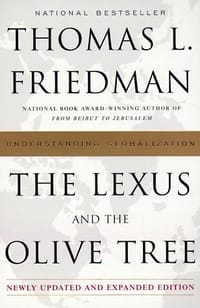在线阅读本书
From one of our most perceptive commentators and winner of the National Book Award, a comprehensive look at the new world of globalization, the international system that, more than anything else, is shaping world affairs today.
As the Foreign Affairs columnist for The New York Times , Thomas L. Friedman has traveled the globe, interviewing people from all walks of contemporary life: Brazilian peasants in the Amazon rain forest, new entrepreneurs in Indonesia, Islamic students in Teheran, and the financial wizards on Wall Street and in Silicon Valley.
Now Friedman has drawn on his years on the road to produce an engrossing and original look at globalization. Globalization, he argues, is not just a phenomenon and not just a passing trend. It is the international system that replaced the Cold War system; the new, well-greased, interconnected system: Globalization is the integration of capital, technology, and information across national borders, in a way that is creating a single global market and, to some degreee, a global village. Simply put, one can't possibly understand the morning news or one's own investments without some grasp of the system. Just one example: During the Cold War, we reached for the hot line between the White House and the Kremlin--a symbol that we were all divided but at least the two superpowers were in charge. In the era of globalization, we reach for the Internet--a symbol that we are all connected but nobody is totally in charge.
With vivid stories and a set of original terms and concepts, Friedman offers readers remarkable access to his unique understanding of this new world order, and shows us how to see this new system. He dramatizes the conflict of "the Lexus and the olive tree"--the tension between the globalization system and ancient forces of culture, geography, tradition, and community. He also details the powerful backlash that globalization produces among those who feel brutalized by it, and he spells out what we all need to do to keep the system in balance. Finding the proper balance between the Lexus and the olive tree is the great drama of he globalization era, and the ultimate theme of Friedman's challenging, provocative book--essential reading for all who care about how the world really works.
托马斯·弗里德曼是《纽约时报》的专栏作家,曾三次赢得普利策奖。在其1999年出版的经典著作《了解全球化:凌志汽车与橄榄树》当中,他提出了新科技和全球化与传统文化的联系,引发了西方学界一场关于全球化问题的大争论。他认为现在的社会必定抵挡不了全球化的浪潮,全球化的趋势是不可阻挡的。在《世界是平的:21世纪简史》出版之前,他已经是美国公认最有影响力的新闻工作者。

